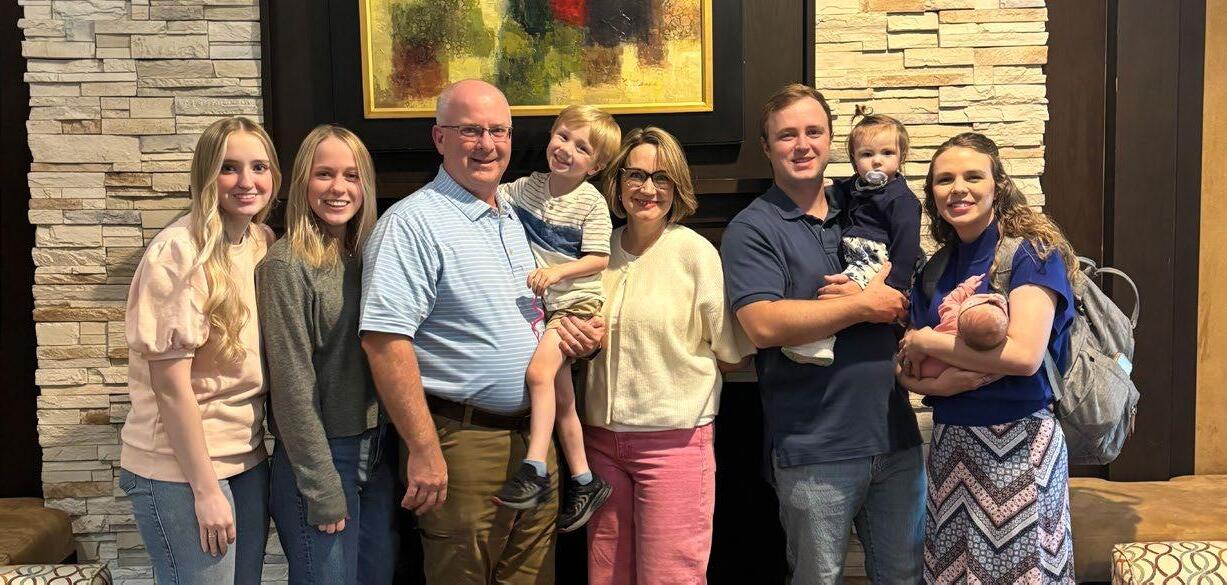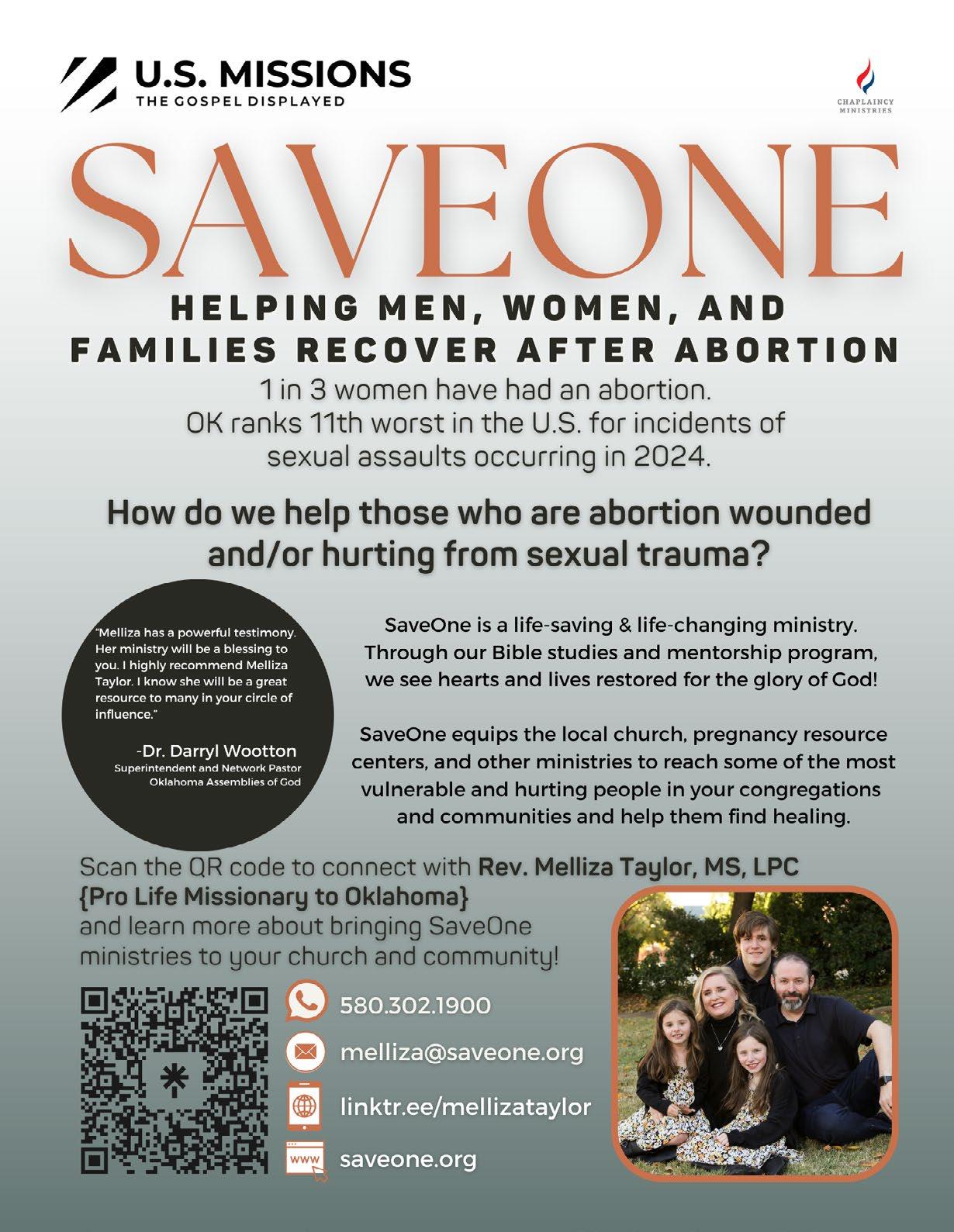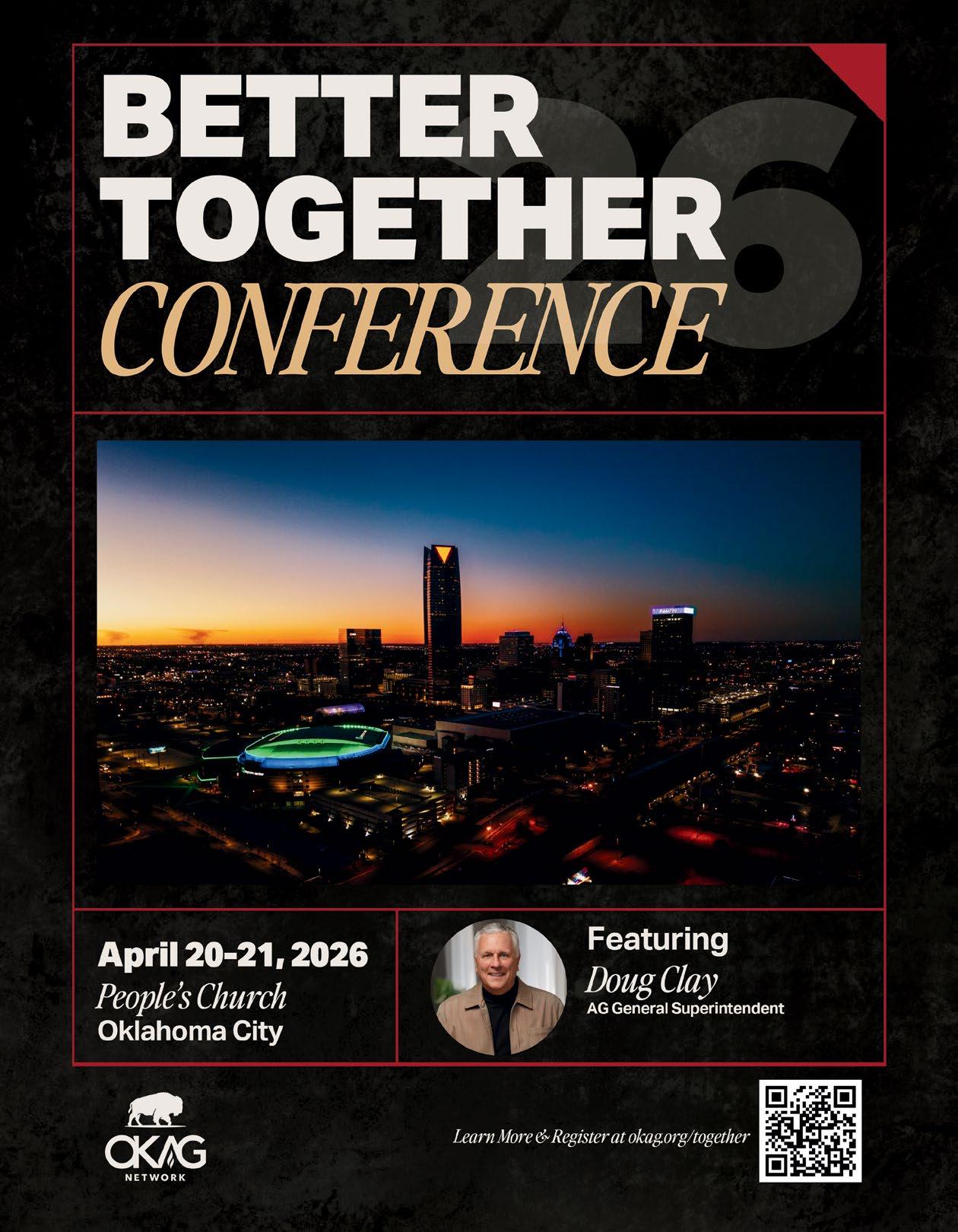Oklahoma OUTLOOK





The Oklahoma Outlook is
Publisher: Dr. Darryl Wootton
Editor: Phil Taylor
Designers: Jayson Evans, Chris Ainsworth
Contributors: Dr. Darryl Wootton, Rollie Dimos, Kevin Conner, Jayson Evans, Steven Goodspeed, Miriam Luginu, Isaac Watham
Advertising: For advertising inquiries, email outlook@okag.org.
www.okag.org

Credential Application–Certified & License Deadline
General Council & National Fine Arts (Orlando)
OSSOM Graduation
Girls Ministries Celebration
New Minister’s Lunch
Rural Pastor’s Summit – West
PK Retreat
Century Leadership Roundtable
Credential Deadline–Ordination
OSOM – Locations 1,2,3
Sacred Assembly
Daughter’s Conference
OSOM – Locations 4,5
Called: One Day
Men’s Conference
Pastor Appreciation Month
OSOM – Locations 1,2,3
Renew Network Retreat
OSOM – Locations 4,5
Hispanic School of Ministry, McAlester
Youth Fest
Light for the Lost Night
Global Workers Appreciation Month
OSOM – Locations 1,2,3
Women of Valor Conference
Youth Pastors Retreat
OSOM – Locations 4,5
Hispanic School of Ministry, McAlester
OKAG Foster Care Conference
Century Leadership Roundtable
Made for This
August 1
August 4-8
August 9
August 16
August 21
August 23
August 30–September 1
September 4
September 5
September 6
September 7
September 12-13
September 13
Sepetember 20
September 26-27
October 1-31
October 4
October 6-8
October 11
October 11
October 17-18
October 26
November 1-30
November 1

November 1
November 6-7
November 8
November 8
November 14-15
November 20
November 21-22


Preaching, pastoring, visitation, prayer, counseling, evangelism, and discipleship are just a few of the many tasks on a pastor’s weekly “to-do” list.
Every one of these assignments is vitally important, and they all sound spiritual; yet two words that may not sound spiritual but are essential to the health of any church are finance and operations. The truth is, no church remains healthy if it fails in these two areas. This issue of The Outlook is dedicated to helping you strengthen these components because both are deeply spiritual.
Church financial integrity is not optional—it is essential. Church finances reflect our reverence for God and our respect for people.
The apostle Paul emphasized this in 2 Corinthians 8:20–21 (NLT): “We are traveling together to guard against any criticism for the way we are handling this generous gift. We are careful to be honorable before the Lord, but we also want everyone else to see that we are honorable.”
God entrusts spiritual leaders with the sacred task of stewarding His resources. If we break that trust even once, it’s nearly impossible to regain. When church leaders mismanage finances, congregants and the broader community inevitably wonder: What else are we mismanaging?
Some may think, “We’re too small to have financial issues because our finances are minimal.” But Jesus teaches otherwise. Luke 16:10–11 (NLT) says: “If you are faithful in little things, you will be faithful in large ones. But if you are dishonest in little things, you won’t be honest with greater responsibilities. And if you are untrustworthy about worldly wealth, who will trust you with the true riches of heaven?”
As a young pastor, I remember the church van being repaired, and the bill came to $401. My spending limit was $400—just $1 over—but I wasn’t authorized. I called the overseers and got approval. I wasn’t trying to make a statement. I was simply trying to operate within the authority I had been given. At the next leadership meeting, they raised my spending limit because I had earned their trust.
If we cannot be trusted with the small things, how can we be trusted with greater things? Church finances are not just about money—they are about maintaining your testimony and upholding the truth. Larry Burkett once said, “The way a church handles money may say more about its faith than the way it preaches sermons.”
Church operations and administration are not just organizational—they are deeply spiritual. When done with excellence, they remove distractions, build trust, and allow the church to focus fully on its God-given mission.
Leading the people of Israel required great administrative skills. In Exodus 18:21–22 (NLT), Jethro advised Moses, “But select from all the people some capable, honest men who fear God and hate bribes. Appoint them as leaders over groups of one thousand, one hundred, fifty, and ten. They should always be available to solve the people’s common disputes… They will help you carry the load, making the task easier for you.” Jethro warned Moses that without a structure for operations and delegation, it would not be good for the people or him.
Aubrey Malphurs once said, “Good administration in the church isn’t about paperwork—it’s about people work.” When you invest time with your team to plan and pray, you’ll discover just how spiritual administration truly is. And when you empower those gifted in administration, the entire church benefits.
I once had a parishioner tell me they had no spiritual gifts because they didn’t sing, preach, or teach. I assured them
they did have a spiritual gift: administration. We soon turned over some key church projects to them, which were better planned and executed than ever. If you’ve ever participated in a well-organized service, ministry, or event, you’ve experienced firsthand how essential administration is to spiritual effectiveness.
I encourage you to take time—at least annually—to review your financial systems and organizational strategies. Strengthen what supports the mission. Protect what undergirds your ministry. Utilize your governance structure to hold the church accountable.
May we always recognize that finance and operations are spiritual disciplines. May we uphold the integrity of our churches by strengthening these foundations with intentionality and prayer.
As always, we are Better Together.

Dr. D.E. Wootton
Superintendent Oklahoma
Assemblies of God

Our Mission Networking together to better share the love of Jesus with the least, last and lost.
A healthy Church in every Community
Our Values
LOVE God together
LIVE healthy lives together
LEAD healthy churches together
LAUNCH healthy ministries together


How one board member blends financial expertise and faithful service to strengthen his local church.
When it comes to church leadership, the voices around the table matter just as much as the voice behind the pulpit. At Spirit Church in Bartlesville, Oklahoma, that balance has led to spiritual growth and practical sustainability.
One of the key figures in maintaining that balance is Josh Randolph—a seasoned financial planner, longtime church member, and faithful board member. We sat down with Josh to discuss his journey, the lessons he’s learned from serving on the church board, and how business principles and biblical stewardship can help him lead the church wisely.
Tell us a little bit about yourself. Where do you live, and what does your family life look like?
I have lived in Bartlesville, Oklahoma, for 22 years. I grew up nearby, in Nowata, so I’ve only made it about 15 miles in 50 years! My wife and I have three kids and three grandkids. I love spending time with them, and when I can, I try to squeeze in some golf and fishing.
What’s your professional background, and what does your day-to-day work look like?
I’m a Certified Financial Planner and lead a wealth management team. In short, I help individuals, families, nonprofits, and businesses build, manage, protect, and transition wealth. A big part of my work is financial, estate, and charitable tax planning. My day-to-day is about understanding people’s goals and mapping out plans that help them sleep at night.
How long have you been involved at Spirit Church?
We joined in 2003 after moving back to Bartlesville. I actually attended the youth group here when it was First Assembly, so it’s been more than 20 years of involvement.
How long have you served on the board?
I’ve been on the board in various roles for about 15 years. I’ve also taught Royal Rangers and currently help lead our Financial Peace University classes twice a year.

How does your day job influence how you serve on the church board?
My job is rooted in planning. That translates well into serving the church: I look at the current finances but also plan ahead—five or ten years out. And just like in my profession, as a board member, I act as a fiduciary. I’m entrusted with something that isn’t mine. That mindset helps me make responsible decisions on behalf of the church.
Some might say that faith and financial planning are at odds. How do you balance vision with responsibility?
There’s a tension between stepping out in faith and being fiscally responsible. But Scripture talks about money and possessions more than any other topic. We’re called to trust God and also to be good stewards. We shouldn’t live crisis-to-crisis as a church. Planning helps us continue doing ministry long-term—even through downturns or unexpected events.
How do you help others see the importance of longterm planning?
We run financial “what if” scenarios. What if giving drops? What if we lose members due to economic shifts? What if a major repair is needed? We don’t want to live in fear but must be prepared. Modeling helps people see the realities of both risk and opportunity.
How do you bring up those difficult realities without becoming the “vision killer” in the room?
It takes trust—both ways. I’ve been blessed with pastors who are visionary leaders who respect the role of the board. They lean on us for insight. It’s important to express concerns but also support the vision. I may say, “Here’s what the numbers say,” but I also trust that our pastors are hearing from God.
Has there been a time when you were proven wrong— where the vision exceeded your expectations?
Definitely, I tend to be conservative. There have been times when I personally wouldn’t have made the same choice, but I trusted the spiritual leadership. And it worked out. I’ve learned to check myself and recognize when God is moving beyond what I see in spreadsheets.
What advice would you give to smaller churches that may not have financial experts on their boards?
Reach out. Plenty of people are willing to help—even once a year for a budget review. If you don’t have that expertise in-house, borrow it. The Kingdom is bigger than one church, and we’re here to serve each other.
What would you say to those who avoid financial conversations because of the stigma around money?
Just ask for help. We all go to a doctor when something hurts. If your finances hurt—personally or as a church—go to someone who knows how to help. It’s not shameful; it’s wise.
Let’s talk about reserves. What should churches consider for emergency savings?
At a minimum, I recommend three months of essential expenses—things like lights, insurance, and critical salaries. Six to twelve months is even better. Here at Spirit Church, we’ve maintained that level consistently. It allows us to keep operating even in tough seasons.
And what about long-term maintenance or large expenses like building repairs?
Those need to be factored in, too. We built that into our budget right after completing the new building. The excess goes into savings if we don’t spend the full amount in one year. When something like an HVAC system goes out, we’re ready.
Speaking of building projects—what was that like for you as a board member?
It was a huge leap. The original plans were far outside our budget, and I had to run the numbers and say, “This isn’t feasible.” Thankfully, the team—including Pastor Darryl Wootton (former pastor of Spirit Church)—was willing to adjust. We built something we could afford and later accelerated loan payments. It was a great balance of vision and stewardship.
How does the board protect the pastor during a building campaign?
We didn’t want Pastor Darryl to carry the burden of wondering if we’d make a loan payment every week. That’s not the pressure a pastor should carry. Our job as a board is to carry that burden so he can lead spiritually. What makes for a healthy pastor-board relationship? Trust and clarity. Our model is pastor-led and board-protected. The pastor casts the vision; we help steward the resources. It has to be a team effort. I trust our pastors to lead spiritually, and they trust us to guide financially.
How did your board navigate the pastoral transition from Pastor Darryl to Pastor Jason (Fullerton)?
It was incredibly smooth. Pastor Darryl’s wisdom in preparing the congregation made a huge difference. And Pastor Jason came in with humility, ready to learn. There was mutual trust, and everyone honored each other’s roles. That’s what made it work.
What do you hope church board members remember about their role?
They are fiduciaries. The money doesn’t belong to them. It’s God’s, and the members have entrusted it to the church’s work. Our job is to manage it faithfully—with wisdom, humility, and service.
Josh’s story reminds us that faith and financial strategy are not enemies. In fact, when paired together with humility and trust, they become a powerful force for healthy ministry.

By Rollie Dimos, CFE, CIA
Stewardship is a common theme woven throughout the Bible and, therefore, part of the everyday role of ministry leaders. As church leaders you are entrusted with tithes, offerings, and other financial resources given to support the church’s mission and ministries.
Managing church finances with integrity and accountability is a core function in the business of ministry. However, financial fraud is an alarming issue affecting churches and religious organizations worldwide. Consider these cases that happened over the past year:
• In April 2025, a church financial secretary was arrested for stealing more than $570,000 over five years. She admitted wrongdoing and is accused of using the church credit card for personal expenses and giving herself extra payroll payments.
• In March 2025, a synagogue bookkeeper pleaded guilty to stealing more than $350,000 from her synagogue, where she had worked for fifteen years. For four and a half years, she used her role to embezzle funds by issuing fifty-five unauthorized
checks to herself and forging the treasurer’s signature. She also manipulated accounting records and altered bank statements to conceal her fraud.
• In March 2025, a church treasurer was charged with stealing more than $200,000 from her church. In the position for five years, the church treasurer was the only one who managed the church’s financial records, bank accounts, debit cards, and checks. She admitted to stealing the funds.
• In November 2024, a church bookkeeper for over two decades was sentenced to twenty-seven months in prison for embezzling $875,000. During a five-month period, she wrote checks to herself but recorded them as payments to approved vendors.
• In November 2024, a priest pleaded guilty to stealing hundreds of donation checks meant for the church and depositing them for personal use. For about a year, the pastor endorsed and deposited over two hundred church donations into his personal bank account. The donations totaled at least $155,000.
Studies suggest that churches lose approximately five percent of their revenue to fraud annually, whether they
are aware of it or not. Most churches still pass the collection plate every Sunday. Losing five percent of their revenue in a year is like receiving the weekly tithes and offering and then throwing it away three weeks in a row. No church can afford to do that. That’s why financial mismanagement—whether intentional or accidental—can deeply damage trust, hinder ministry effectiveness, and lead to severe reputational consequences.
According to a study by Christianity Today, the average church only saves two percent of its budget each year for reserves. Losing five percent of your budget to fraud could mean the difference between having a margin at the end of the year or scrambling to reduce spending to balance the budget. The same study found that the average church spends nine percent on mission yearly. Losing five percent of your budget to fraud could mean cutting your mission budget in half.
For smaller churches, losing even a small percentage of revenue can be financially devastating. Understanding the risks and proactively implementing fraud prevention strategies is essential to safeguarding ministry finances.
The challenge for church leaders is twofold: maintaining a culture of trust and generosity while also implementing financial safeguards to reduce risk. Too often, churches rely on goodwill and trust rather than accountability and fail to put in place necessary controls to protect the integrity of their financial processes.
While churches aim to cultivate trust and encourage generosity, these qualities can leave organizations vulnerable to fraud and financial mismanagement. While it’s imperative to hire ministry-minded staff and engage willing volunteers to help perform the church’s ministry, it seems overly burdensome to make them adhere to complex processes designed to add layers of review and approval. These necessary and important processes can unintendedly slow down and overwhelm engaged team members. As a result, key controls get bypassed or overridden. Additionally, smaller ministries with limited bookkeeping staff often struggle with segregating financial duties, making it easier for fraudulent activity to go undetected.
Several high-profile financial scandals in ministry settings have demonstrated the devastating consequences of lax financial oversight. Fraud can happen at any level of an organization and often involves deeply trusted individuals within the church. Unfortunately, religious and charitable organizations have been identified as being especially susceptible to fraud, losing millions of dollars annually to financial misconduct.
A study by the Association of Certified Fraud Examiners has shown that nonprofit and religious organizations frequently have fewer financial controls than for-profit companies and are, therefore, more susceptible to fraud, waste, and abuse. This same study found that religious organizations that have been the victim of fraud experienced a median loss of $85,000, with some cases exceeding six and seven figures.

To reduce financial fraud, churches must establish clear accountability measures, embrace financial transparency, and create internal controls that prevent opportunities for theft or mismanagement. These measures not only protect church finances but also uphold ethical standards and demonstrate good stewardship. Like the Apostle Paul, we must take great care “to do what is right, not only in the eyes of the Lord but also in the eyes of man” (2 Cor 8:21).
Here are ten key practices church leaders can adopt to help demonstrate good stewardship, reduce the risk of fraud, and create a financial culture of integrity:
1. Embrace Financial Transparency: Accountability should be woven into the organization’s DNA. Leaders must promote open communication and ensure that financial processes are accessible and understood.
2. Document Policies and Procedures: A clear set of written financial policies helps define expectations and prevents uncertainty or manipulation.
3. Minimize Exceptions: Church finances should be held to the highest standard, meaning everyone follows the same rules—including leadership.
4. Segregate Financial Duties: No single individual should have complete control over financial transactions. Split key financial duties and implement checks and balances to prevent unauthorized actions.
5. Cash Handling: Always ensure two or more people count cash offerings and prepare deposits to prevent misappropriation.
6. Disbursements: Require a three-way match for payments—purchase approval, proof of receipt or service completion, and a valid invoice—to ensure the appropriateness of the expense.
7. Credit Cards: Require receipts for all transactions and implement strict purchase guidelines.
8. Wire Transfers: Ensure at least two individuals are involved in all electronic fund transfers.
9. Payroll: Segregate payroll duties to prevent unauthorized payments or salary adjustments.
10. Fixed Assets Audits: Conduct annual audits of church property and assets to ensure proper tracking and security.

One of the most important responsibilities for pastors and church boards is ensuring strong financial procedures are in place. By virtue of their role, board members have several fiduciary responsibilities established by the state laws that govern your church as a corporation. These responsibilities often surprise pastors and board members when they realize the significance of these legal and fiduciary duties. These duties include:
• The duty of loyalty: a board member must put the organization’s interests ahead of his or her interests.
• The duty of care: a board member must act in good faith, and exhibit reasonable inquiry, skill, and diligence.
• The duty of obedience: a board member must know and obey the organization’s governing documents and applicable state and federal laws.
These responsibilities should be a core part of your decision-making process because if board members act
contrary to their fiduciary duties, there could be legal ramifications. For example, a nonprofit board in New York was accused of gross negligence for failing to monitor conflict of interest and excess compensation issues. The state attorney general found the board members’ lack of due diligence and conduct was egregious and fined the nonprofit, its president, and its board members $5.5 million.
In California, the state attorney general sued a nonprofit and its board members for improperly using restricted funds. The attorney general argued that the board members failed in their duty to act in good faith and make reasonable inquiries on how the nonprofit’s director and employees were using restricted funds.
To help fulfill your fiduciary duties (i.e., the duty of care), church leaders can perform a mini-assessment to measure the effectiveness of your current financial processes by answering the following questions:
1. Are financial duties properly segregated? If a single person has full control over transactions, consider adding additional oversight.
2. Are contributions and cash receipts handled securely? Ensure proper counting, documentation, and reconciliation of donations.
3. Do we require proper documentation for disbursements? Every payment should have clear authorization and supporting invoices.
4. Is payroll processed with sufficient oversight? Regularly review payroll transactions to prevent errors or fraud, and properly document gift card distributions, bonuses, and compensation adjustments.
5. Does the church have an accountable reimbursement plan? Ensure that business expense reimbursements are properly recorded and supported.
6. Is credit card usage controlled and monitored? Best practices include setting purchase limits, requiring receipts, and establishing an approval process.
7. Do we actively monitor the church budget? Track revenue and expenses against a predetermined financial plan.
8. Are financial reports prepared and reviewed monthly? Provide comprehensive financial statements to the board or a finance committee for regular analysis.
If any areas seem to fall short, work with your staff to make the necessary corrections to improve oversight and accountability.
Financial integrity is non-negotiable for churches seeking to honor biblical principles of stewardship. Leaders must prioritize accountability, transparency, and ethical financial management. By implementing internal controls, churches can prevent fraud, strengthen operational integrity, and build lasting trust with members and donors.
Embracing financial accountability is not simply about preventing fraud—it is about protecting the mission of the church. Whether your ministry is large or small, these financial safeguards serve as a defense, ensuring that church resources are used responsibly and ethically. By integrating these best practices, churches can effectively safeguard their financial operations, reduce fraud risk, and ensure long-term financial stability.

Rollie is the President of Administrative Consulting Ministry, which provides internal control audits, fraud investigations, and financial consulting for churches and nonprofits. Rollie has served as the internal auditor for the Assemblies of God national office for the past 19 years. He is the author of Balanced Budget, Balanced Life: 10 Steps to Transforming Your Finances (Salubris, 2019) and Integrity at Stake: Safeguarding Your Church From Financial Fraud (Zondervan, 2016). You can contact him at rollie.dimos@gmail.com


By Steven Goodspeed
Churches are a sacred assembly of believers in Jesus Christ who meet regularly in a specific geographic area for worship, teaching, fellowship, and service; under the authority of the Bible and the guidance of the Holy Spirit. However, their unique legal and operational structures expose them to specific risks in our modern society that, if mishandled, can lead to costly consequences, including lawsuits, loss of tax-exempt status, or damaged reputations for the church, its pastors, and their gospel witness in a watching community.
This brief article outlines the seven most common legal pitfalls we see churches encounter in our national church law practice and provides practical strategies to avoid
them. By addressing these issues proactively, church leaders can safeguard their organizations and focus on their core Gospel mission.
General non-executive employment agreements are powerful tools for churches, particularly for protecting sensitive information, staying out of court, and aligning workplace practices with individual church values. Unlike employee handbooks and their acknowledgment forms, which are not legally binding, general employment agreements are signed contracts that clarify expectations at the outset of employment. Properly drafted, these agreements do not alter an employee’s “at-will” status, meaning employers can still terminate employment at any time for lawful reasons. Key benefits of these agreements include:
• Confidentiality: Protecting sensitive organizational data, such as donor and counseling information.
• Intellectual Property (IP) Ownership: Clearly defining ownership of work created by employees, such
as educational materials, program content, and design.
• Biblical Dispute Resolution: For churches, these agreements can mandate Biblically grounded dispute resolution processes, aligning with scriptural principles (e.g., Matthew 18:15–20) and reducing reliance on secular courts. Properly drafted Biblical dispute resolution clauses are an important way to minimize employment and other legal risks.
Churches that fail to implement these agreements risk disputes over IP, breaches of confidentiality, or costly litigation. To avoid this pitfall, consult experienced church legal counsel to draft tailored employment agreements that reflect your church’s mission and legal requirements.
Incorporating Biblical dispute resolution provisions into contracts, even beyond general employment agreements, is a critical safeguard for churches. These provisions prioritize private Biblical mediation or arbitration over public court litigation, which can be expensive, adversarial, and damaging to a church’s public testimony. Biblical dispute resolution, rooted in scriptures like Matthew 18:15–20 and 1 Corinthians 6:1–8, emphasizes reconciliation, relationship preservation, and cost savings. These clauses should appear in the following:
• Church bylaws
• Employment contracts
• Membership or enrollment (school/daycare) agreements
• Facility Use License Agreements (FULAs)
• Volunteer agreements
• Liability releases and waivers
The process typically progresses from informal conciliation to mediation and, if necessary, binding Christian arbitration. However, limitations apply, such as criminal matters, cases involving minors without parental consent, or situations with approaching statutes of limitations. By embedding these provisions, churches maintain greater control over dispute outcomes and align resolutions with their values, avoiding the unpredictability of secular courts.
Facility Use License Agreements (“FULAs”) are essential for churches that allow third parties to use their properties, such as churches hosting community events or leasing space to external groups. Unlike standard leases, FULAs exempt churches from burdensome lease laws and provide clarity on liability, insurance, damages, and indemnification. They should also mandate Christian dispute resolution, keeping disputes out of secular courts. FULAs offer additional protections:
• Mission Alignment: They ensure that activities on the property align with the church’s governing documents, statement of faith, and mission, reducing the risk of the property being classified as a “public accommodation” that must allow unrestricted access.
• Reputation Management: By setting clear terms, FULAs help prevent misuse of the church’s property, for example, hosting an event in opposition to its biblical beliefs, which could lead to negative publicity.
Without FULAs, churches risk legal disputes, loss of tax benefits, or public relations crises. Implementing these agreements is a proactive step to mitigate risk and maintain operational control.
Employee separation agreements are critical for managing the risks associated with terminating employees under challenging circumstances. These agreements protect churches by securing a release of claims, ensuring confidentiality, and preventing disparagement. However, they must comply with federal laws, including the Older Workers Benefit Protection Act (“OWBPA”), which applies to employees over 40.
The OWBPA mandates seven specific statements in active voice, including a 21-day waiting period for employees to review the agreement and a 7-day revocation period after signing the separation agreement. Churches should never pay the severance amount identified in the separation agreement in either a lump sum or before the OWBPA’s mandatory revocation period ends. Such payments may render the separation agreement invalid, unenforceable, and/or void. Thus, any such payment could be deemed as nothing more than a simple, unconstrained payment to the employee. Furthermore, mishandling separation agreements can lead to lawsuits or wrongful termination claims, undermining the church’s stability. Consulting experienced church attorneys to draft compliant agreements is essential for minimizing these risks.
Churches that fund international projects or organizations must navigate complex federal regulations to maintain their tax-exempt status and ensure donor contributions qualify for charitable deductions. Simply sending money or resources abroad without proper oversight is a significant legal pitfall. The Internal Revenue Code (IRC) Section 170(c)(2) requires churches to exercise “expenditure responsibility” through:
• Pre-Grant Assessment: Reviewing proposed projects to ensure they align with charitable objectives.
• Grant Agreements: Establishing clear terms for fund distribution and use.
• Monitoring and Reporting: Conducting periodic financial audits and requiring regular statements from recipient organizations.
Churches should also conduct due diligence using resources like the United States (“U.S.”) Treasury’s Specially Designated Nationals (SDN) List and the State Department’s Terrorist Exclusion List to avoid funding prohibited entities. Alternatively, obtaining a written legal opinion confirming that a foreign organization is equivalent to a U.S. charity can provide additional protection. Failure to follow these protocols risks IRS penalties or loss of tax-exempt status, jeopardizing donor trust.
Inconsistent or outdated governing documents, such as articles of incorporation and bylaws, create significant risks for churches. For example, if bylaws state that the board of directors makes all decisions, but the articles of incorporation grant voting rights to an undefined group of “members,” confusion and disputes can arise. In such cases, the articles of incorporation typically take precedence, but unresolved conflicts can lead to:
• Noncompliance with federal, state, or local laws
• Challenges to corporate actions
• Fiduciary duty violations
• Increased liability from lawsuits
• Loss of donor or public trust
To avoid these issues, churches should conduct annual reviews of their governing documents, ensuring they are current, consistent, and compliant with legal requirements. Engaging experienced church legal counsel to update these documents as needed is a proactive measure to maintain operational integrity.
Proper documentation of employee performance, discipline, and job descriptions is critical for legal compliance and organizational efficiency. Common mistakes include failing to conduct or document performance evaluations, not recording disciplinary actions, or maintaining inaccurate records. Supervisors should document verbal disciplinary actions in writing, and written actions must accurately reflect the pending issues.
Inconsistent or incomplete documentation can weaken a church’s position in disputes, such as wrongful termination claims, and create operational inefficiencies. For example, outdated job descriptions may misalign current roles, leading to confusion or unmet expectations. Churches should establish standardized processes for documenting employee-related actions and train managers to follow them consistently.
Churches face unique legal challenges that require vigilance and proactive measures to protect their missions and resources. Churches can avoid common pitfalls by implementing general employment agreements, mandating biblical dispute resolution, using FULAs, crafting compliant separation agreements, handling international grants with care, maintaining consistent governing documents, and documenting employee actions properly. These strategies reduce legal risks and strengthen organizational integrity, fostering trust among stakeholders. Church leaders should partner with experienced legal counsel to tailor these solutions to their specific needs, ensuring compliance and sustainability in an increasingly complex regulatory environment.

Steven is a partner at My Church Law Firm in Flower Mound, Texas. My Church Law Firm is a national law firm focusing exclusively on church, private school, and nonprofit law. You can view Steven’s bio at https://www.mychurchlawfirm.com/ attorneys/steven-goodspeed/.

When you answer a call from God to enter vocational ministry, there are many things you know you are saying yes to: living a life of integrity, shepherding God’s people, praying, studying, and preaching God’s word. You are saying yes to sharing your life with God’s people and leading them into a deeper walk with the Lord. These are many of the things you likely already know.
However, when you answer a call from God to enter vocational ministry, there are many things you are saying yes to, of which you might not be aware. You are saying yes to more than spiritual leadership. You are saying yes to leadership in all facets. And to be successful, you must know more than how to pray and preach.
You must know a little about payroll, human resources, insurance, legal and compliance issues, property management, facilities maintenance, budget management, financial reporting, fundraising, volunteer screening, and training. You must learn to assemble and lead teams, committees, and boards. You must know a lot about the Bible, but you must also know more than you ever wanted about your Constitution & Bylaws, policies, and procedures.
A lack of good leadership will lead to a lack of vision and produce little results. All the best leadership in the world also requires good management. Leadership shows the way, but management helps you avoid or navigate your way through the pitfalls and ditches. Poor management can cause a very good ministry to find itself in a ditch that is very difficult to preach and pray your way out of. Very few pastors are experts in all these areas, but you will be hard-pressed to find any pastor with time under his or her belt who has not had to drill deep in one or many of these areas through the years.
No leader needs to be an expert in everything, but every leader needs to know where to find the information they need when needed.
Below are some of the best resources available to help provide a starting point. I use many of these regularly, and I hope you might find them helpful as you lead your ministry.
1. The Church Network https://www.thechurchnetwork.com/
2. Evangelical Council of Financial Accountability https://www.ecfa.org/
3. Empowering Stewardship https://empoweringstewardship.com/
4. My Church Law Firm https://www.mychurchlawfirm.com/
5. Society of Human Resources Management https://www.shrm.org/home
6. Church Law & Tax https://www.churchlawandtax.com/
Other than the Society of Human Resources Management, all of these are Christian-centric resources that I highly recommend. There are many great webinars, some free and some low-cost. The information is up-to-date, and they fully understand churches and ministries’ needs.

Kevin Conner OKAG Director of Finance and Operations







For many churches and ministries, the financial side can feel like a burden— complex, tedious, or even intimidating. However, when handled with care, church bookkeeping becomes more than compliance or record keeping. It becomes stewardship. Responsible bookkeeping is one of the most foundational aspects of sustaining ministry.
It provides clarity for donors, confidence for boards, and direction for leadership. While it often operates behind the scenes, solid financial practices set the stage for credibility and growth.
Below are several best practices for ministry bookkeeping and practical steps churches and ministries of all sizes can take to strengthen their financial integrity.
One of the most important practices for any ministry—regardless of size—is to establish a clear separation between personal and church finances. Mixing funds, even accidentally, can lead to confusion and, over time, erode trust. Churches should always maintain separate bank accounts for ministry use. Personal expenses should never flow through church accounts, and vice versa. Even in small churches with part-time or bi-vocational pastors, this level of clarity is essential.
Letting receipts and transactions pile up until tax season is a recipe for stress and errors. Weekly bookkeeping creates a consistent rhythm that prevents backlogs and makes audits—or simple reviews—far more manageable. Scheduling time each week, even 30 minutes, to log transactions, file receipts, and reconcile accounts keeps financial data current. This allows leadership to make informed decisions based on accurate, real-time information rather than guesswork or outdated numbers. Consistency also reduces the risk of missing key documents or misclassifying spending, which can be difficult to correct months later.
In every area of ministry finance, two sets of eyes are better than one. Dual control is the practice of involving at least two individuals in key financial tasks such as:
• Counting and depositing offerings
• Entering data into accounting systems
• Reviewing monthly reports
• Approving large purchases or reimbursements
This structure not only protects against misuse but also builds transparency and accountability into the church’s culture. Even in small settings, this can be implemented by involving a board member, volunteer, or trusted retiree in oversight roles.
Every month, churches should reconcile their internal records with actual bank statements. If there’s a discrepancy, it should be investigated immediately. This step is crucial in catching errors, missed transactions, or potential fraud. Regular reconciliation ensures that the numbers in the system reflect the actual activity of the account. It also gives ministry leaders confidence that their reports are accurate and reliable. Skipping this process, even occasionally, can cause financial blind spots that accumulate over time.
While Excel spreadsheets can serve as a basic entry point, they lack scalable, secure, and auditable financial management. Ministries should invest in dedicated accounting software for nonprofits, such as QuickBooks for Nonprofits, Realm, Aplos, or others.
These tools offer features like fund accounting, donor tracking, built-in reporting, and cloud backups—capabilities that are essential as churches grow and become more complex in their financial operations.
Budgeting is more than crunching numbers—it’s a strategic reflection of vision. Churches should regularly evaluate whether their spending patterns align with their stated mission. Ask:
• Are we investing in what we say matters most?
• Does our giving reflect our call to local and global outreach?
• Are administrative costs in balance with ministry goals?
Financial reports should be accurate and meaningful. When reviewed thoughtfully, they become tools for evaluating impact, setting priorities, and planning for the future.
Each financial transaction reflects a piece of a larger story: a child going to camp, a missionary being supported, and a family finding community. Ministry bookkeeping is not just about balancing ledgers—it’s about tracking and celebrating what God is doing through His people’s generosity.
Churches should be intentional about sharing these stories. Whether in annual reports, donor letters, or visual presentations, show how the money was used to further the mission.
When people see the fruit of their giving, they’re more likely to continue giving—and giving sacrificially.
One of the most common financial pitfalls in ministry is procrastination. Leaders may delay setting up systems or overlook inconsistencies, believing they’re too small to matter. However, small issues left unaddressed can lead to big problems.
It’s far better to take preventive steps now than to clean up a mess later. Here are a few ways to start:
• Schedule a financial review with your board or a trusted advisor
• Create or update financial policies and procedures
• Offer training to your treasurer or finance team
• Organize receipts and digitize your filing system
Early action is almost always less painful—and more effective—than crisis response.
No one should handle church finances alone. Whether you’re a solo pastor or a leader of a larger team, share the responsibility and create greater accountability. That team might include:
• A volunteer bookkeeper
• A church board member with a financial background
• A retired accountant in your congregation
• An outside consultant for quarterly reviews
In a time when financial missteps have eroded public trust in many institutions, churches have an opportunity to rise above reproach. Responsible bookkeeping is a critical expression of ministry leadership. It’s how we honor the sacrifice of the giver and reflect the values of the Kingdom.









Thank you for praying for our Oklahoma Missionaries! For more information, please contact the Mission office.
Nathan & Emily Blackmore blackmoremissions@gmail.com Liverpool/Europe
Aaron & Krista B
Contact OKAG Mission for email info. **Sensitive Country
Jordan & Shea Campbell shea.campbell@eu.agwm.org Germany/Europe
Darin & Dianna Clements drclements97@outlook.com
Destry & Cynthia Dobbs dobbs@tulsaxa.com
Tim & Lynley Hatcher tim_hatcher@wycliffe.org
Bethany H
Philippines, Asia Pacific
Chi Alpha TU
Wycliffe Bible Translators
Contact OKAG Mission for email info. Latin America Caribbean
Trent & Tina Morrow trent.morrow@lacagwm.org Uruguay, Latin America
Joleta Nash joleta.nash@gmail.com
Ryan & Lauren Plute laurenplute@gmail.com
Audra S
Chaplaincy–Widow Care
International Ministries
Contact OKAG Mission for email info. **Sensitive Country
Michael & Jaylynn Sperry sperry1232@gmail.com
Melliza Taylor melliza@saveone.org
Shawn & Brenna Tayon shawntayon@hotmail.com
Kailee & Samuel U
Chi Alpha UCO
SaveOne
Intercultural Ministries
Contact OKAG Mission for email info. **Sensitive Country
Joshua & Lisa Sears awakentheamazon@gmail.com
Brazil
For this edition of the Oklahoma OUTLOOK, we invited lead pastors from our Network to share their experiences in ministry, particularly how their expectations of pastoral leadership have changed over time. We asked them to reflect on their initial perceptions of what being a lead pastor would entail and to discuss what they have discovered about the role since then.

Average Years in Ministry





The Slay the Giant campaign is our bold, faith-filled initiative to eliminate the $4.7 million debt at Camp Cargill—one verse at a time.

At our annual PK (Preacher's Kids) Retreat over Labor Day weekend, Dr. Darryl Wootton, Superintendent of the Oklahoma Assemblies of God, will attempt to quote the entire book of Hebrews from memory— all 303 verses.
We're inviting you to sponsor Dr. Wootton—per verse. But there's a twist: You only pay for the verses he quotes correctly.
Camp Cargill is more than cabins and recreation—it's sacred ground. Last year alone, over 8,500 students and leaders encountered God there. It's where callings are confirmed. Chains are broken. And lives are changed forever.
We need you.
We need your church.

We need to spread the word.
Let's join the battle.
Let's speak the Word.
Let's crush the debt.
One verse at a time.


Scan the QR Code to donate, or visit okag.org/home#giant to learn more
